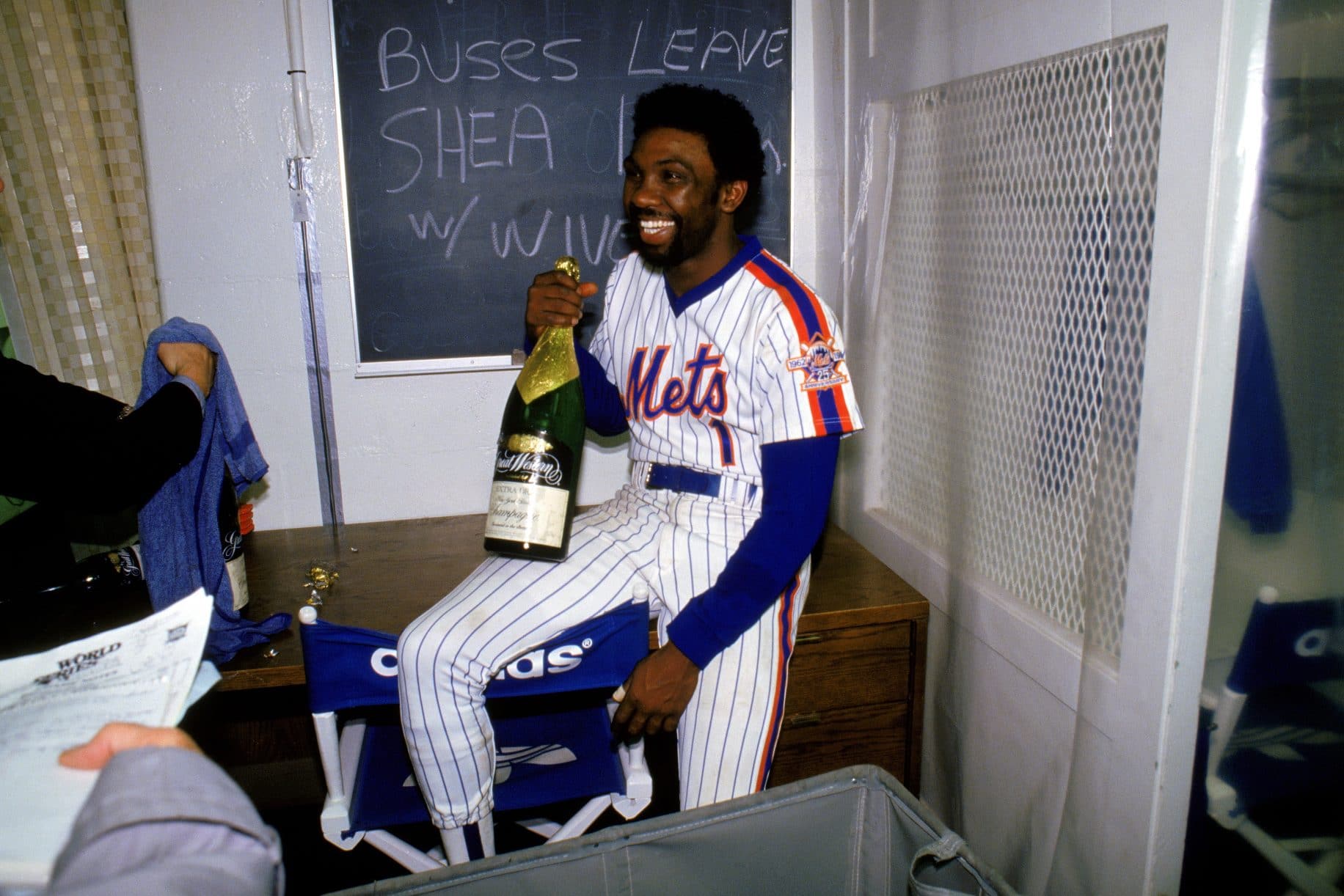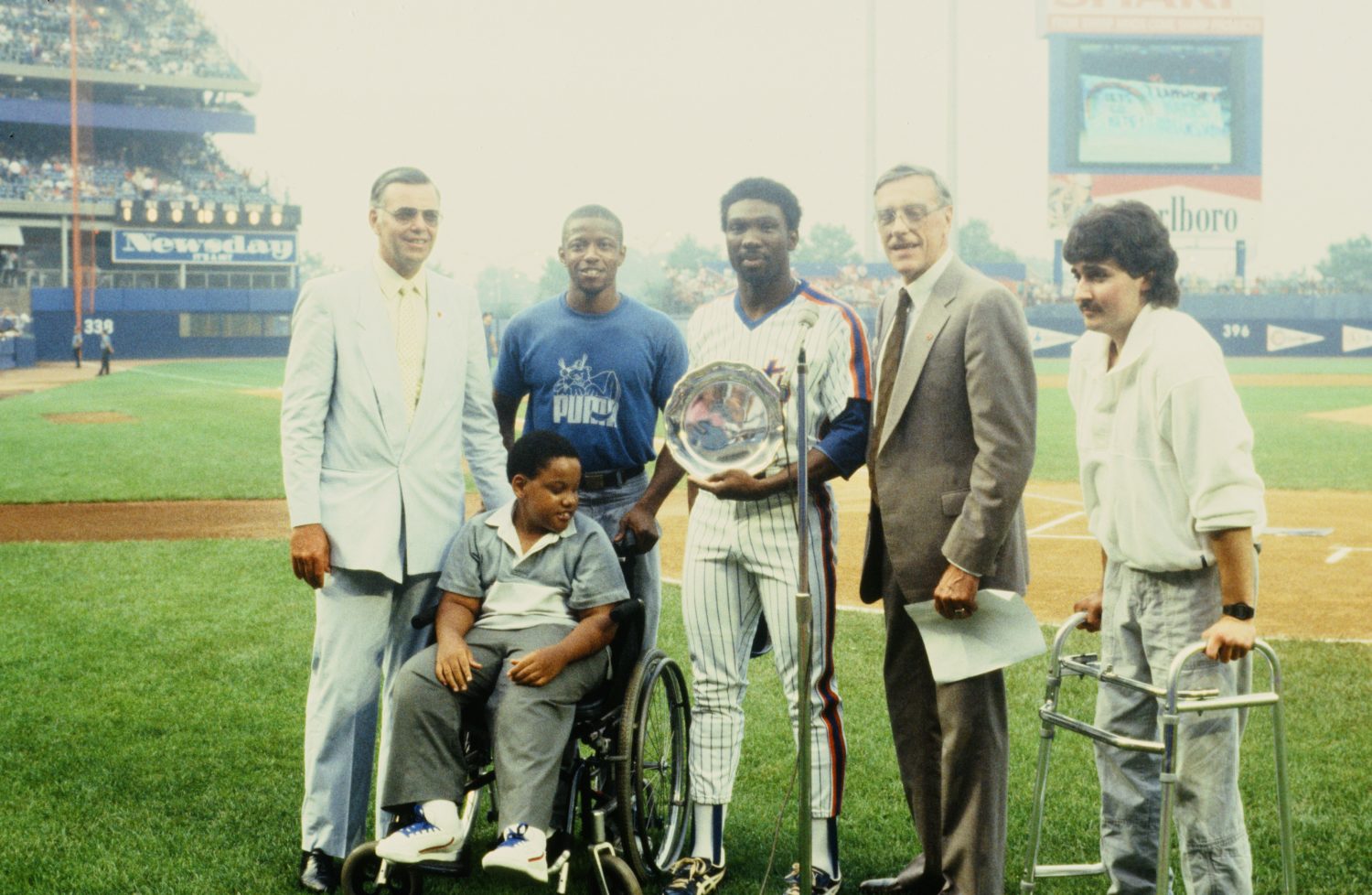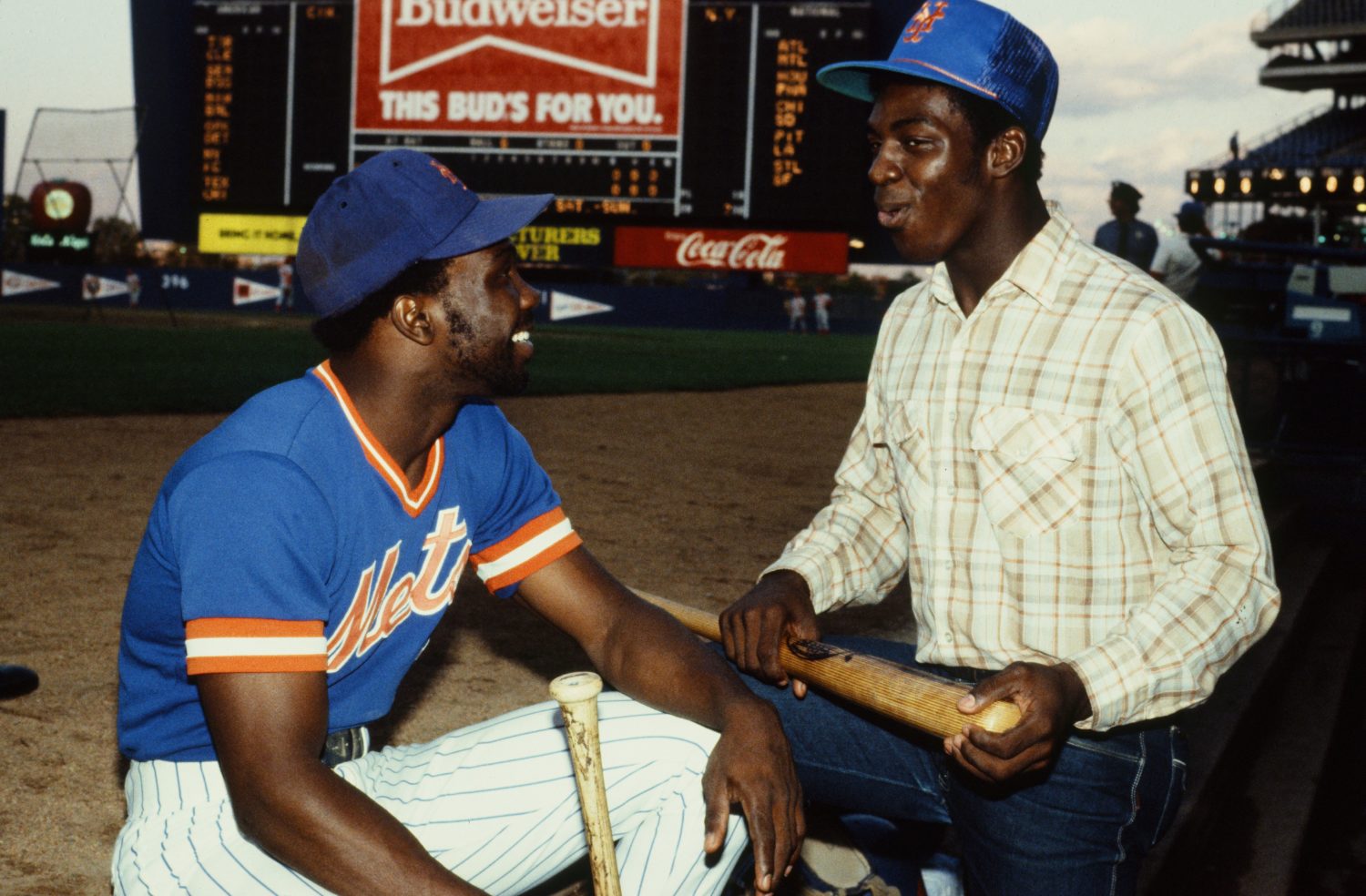Mookie Wilson: The Unforgettable Smile & 1986 World Series Legend
Few names resonate with the electric energy and heart-stopping drama of 1980s baseball quite like Mookie Wilson. More than just a player, William Hayward "Mookie" Wilson became an emblem of the New York Mets' gritty, charismatic era, forever etching his name into the annals of sports history with a single, unforgettable play. His journey from a promising young talent to a World Series hero is a testament to perseverance, speed, and an infectious spirit that captivated fans across the nation.
Born on February 9, 1956, in Bamberg, South Carolina, Mookie Wilson's path to Major League Baseball was paved with dedication and an undeniable athletic prowess. While his career spanned 12 seasons with both the New York Mets and the Toronto Blue Jays, it was his time in the orange and blue, particularly the climactic moments of the 1986 World Series, that cemented his legendary status. This article delves into the life and career of Mookie Wilson, exploring his personal journey, his impact on the game, and the enduring legacy of a man whose smile was as bright as his speed on the basepaths.
Table of Contents
- Who is Mookie Wilson? A Brief Introduction
- Mookie Wilson: Personal Data & Biography
- The New York Mets Era: Speed, Energy, and Fan Favorite
- The Iconic 1986 World Series: A Defining Moment
- Post-Mets Career and Coaching Legacy
- Mookie Wilson's Enduring Impact on Baseball and Beyond
- Mookie Wilson: Stats and Achievements
Who is Mookie Wilson? A Brief Introduction
William Hayward "Mookie" Wilson is an American former Major League Baseball outfielder and coach, whose career spanned from 1980 to 1991. Predominantly known for his time with the New York Mets, Mookie Wilson was a quintessential leadoff hitter, renowned for his blazing speed, aggressive baserunning, and ability to hit for contact. Beyond his on-field skills, he was a beloved figure in the clubhouse and among fans, recognized for his infectious enthusiasm and that unmistakable, wide smile. His contributions to the Mets' 1986 World Series championship run solidified his place as a legend in the franchise's history, particularly for his pivotal role in one of the most memorable plays in World Series lore. He wasn't just a player; he was a symbol of an era defined by grit, determination, and a never-say-die attitude.Mookie Wilson: Personal Data & Biography
To truly appreciate the journey of Mookie Wilson, it's essential to look at the foundational details of his life and career. Born in the heart of South Carolina, his athletic talents were evident from a young age, setting the stage for a professional career that would captivate millions.| Attribute | Detail |
|---|---|
| Full Name | William Hayward Wilson |
| Nickname | Mookie |
| Born | February 9, 1956 (Thursday) |
| Birthplace | Bamberg, South Carolina, USA |
| Position | Outfielder (primarily Center Field) |
| Bats | Switch |
| Throws | Right |
| Height | 6' 0" (183 cm) |
| Weight | 170 lbs (77 kg) |
| Draft Status | New York Mets, 2nd Round (1977) |
| MLB Debut | September 2, 1980 (at 24 years old) |
| Teams Played For | New York Mets (1980-1989), Toronto Blue Jays (1989-1991) |
| Post-Playing Career | MLB Coach (Mets, various minor league roles) |
Early Life and Amateur Career
William Hayward Wilson, affectionately known as "Mookie" from a young age, was born and raised in Bamberg, South Carolina. His athletic gifts were evident early on, excelling in multiple sports. While baseball would ultimately be his calling, his versatility and natural athleticism were foundational to his later success. He attended Arizona State University, a perennial baseball powerhouse, where he honed his skills against top collegiate competition. His impressive performance in college caught the eye of Major League scouts, leading to his selection by the New York Mets in the second round of the 1977 amateur draft. This marked the beginning of his professional journey, a path that would take him from the minor leagues to the grandest stage in baseball.Professional Debut and Rise to Stardom
After a few years developing in the Mets' minor league system, Mookie Wilson made his Major League debut on September 2, 1980, at the age of 24. From the moment he stepped onto the big league field, his impact was palpable. His speed immediately made him a threat on the basepaths, turning singles into doubles and constantly putting pressure on opposing defenses. He quickly established himself as the Mets' primary center fielder and leadoff hitter, a role perfectly suited to his skillset. His ability to spray the ball to all fields, coupled with his exceptional speed, made him a consistent on-base threat. Fans quickly gravitated towards his high-energy style of play and his ever-present smile, making him a fan favorite in New York.The New York Mets Era: Speed, Energy, and Fan Favorite
The 1980s New York Mets were a team defined by their vibrant personalities, aggressive play, and undeniable talent. At the heart of this dynamic squad was Mookie Wilson. He embodied the team's spirit: relentless, exciting, and always pushing the envelope. As a switch-hitter, he provided versatility at the plate, capable of hitting from either side depending on the pitcher. His primary weapon, however, was his speed. He was a constant threat to steal bases, often disrupting the rhythm of opposing pitchers and catchers. This made him an ideal leadoff hitter, setting the table for the power hitters who followed in the lineup. Beyond his offensive contributions, Mookie Wilson was a spark plug in the dugout and a leader by example. His infectious enthusiasm and positive demeanor were crucial in fostering the team's camaraderie and competitive fire. He was known for his hustle, always running out every ground ball and chasing down every fly ball with maximum effort. This commitment to the game, combined with his approachable personality, endeared him to the demanding New York fanbase. He wasn't just a player; he was a symbol of the Mets' resurgence, a key piece of a team that was building towards greatness.Beyond the Bat: Mookie's Defensive Prowess
While his offensive contributions and baserunning are often highlighted, Mookie Wilson was also a highly capable outfielder. Playing primarily center field, he covered vast amounts of ground with his exceptional speed, tracking down fly balls that many other outfielders couldn't reach. His quick reactions and strong arm made him a reliable defender, often making highlight-reel plays that saved runs and energized the team. He possessed an innate understanding of angles and trajectories, allowing him to position himself effectively. This defensive reliability was crucial for a Mets pitching staff that relied on their outfielders to make plays behind them. His all-around game made him an invaluable asset to the Mets throughout the 1980s, contributing significantly to their success beyond just his batting average and stolen bases.The Iconic 1986 World Series: A Defining Moment
The 1986 World Series between the New York Mets and the Boston Red Sox is arguably one of the most thrilling and dramatic championship series in baseball history. For Mookie Wilson, it was the stage upon which he would forever etch his name into baseball lore. The series was a seesaw battle, culminating in a pivotal Game 6 at Shea Stadium. The Mets, trailing 3-2 in the series, found themselves down 5-3 in the bottom of the 10th inning, with two outs and nobody on base. The Red Sox were just one out away from their first World Series title since 1918. What followed was a sequence of events that defied belief and became a cornerstone of baseball legend. The Mets mounted an improbable rally, fueled by singles from Gary Carter and Kevin Mitchell, and a wild pitch that scored Carter. With the score now 5-4, and runners on first and third, the stage was set for Mookie Wilson. He stood at the plate, arcing his bat, focusing intently on Red Sox pitcher Bob Stanley. The tension in Shea Stadium was palpable; every fan, every player, every broadcaster knew the stakes. Mookie Wilson realized that he represented the potential for an unbelievable comeback, a chance to keep the Mets' World Series dreams alive.The Ball Through Buckner's Legs: History Etched
With the count full (3 balls, 2 strikes), Mookie Wilson fouled off several pitches, extending the at-bat and ratcheting up the drama. Then, on the 10th pitch of the epic confrontation, Mookie hit a slow ground ball down the first base line. What happened next is burned into the collective memory of baseball fans. The ball rolled towards Red Sox first baseman Bill Buckner. In a moment that would haunt him for the rest of his life, the ball went through Buckner's legs. Ray Knight, who was on second base, scored the tying run, and Mookie Wilson, racing towards first, was safe as Kevin Mitchell scored the winning run from third. This "history changing ground ball that rolled through Boll Buckner's legs in the bottom of the 10th" not only secured an improbable Game 6 victory for the Mets but also shifted the momentum of the entire series. The Mets went on to win Game 7, securing their second World Series championship. For Mookie Wilson, this single play transformed him from a popular player into an enduring Mets legend. It wasn't just about the error; it was about the relentless at-bat, the pressure, and Mookie's ability to put the ball in play when it mattered most. The play became synonymous with his name, a testament to his tenacity and his role in one of baseball's most iconic moments.Post-Mets Career and Coaching Legacy
After his illustrious tenure with the New York Mets, Mookie Wilson was traded to the Toronto Blue Jays in 1989. He played for the Blue Jays for two and a half seasons, continuing to contribute with his speed and veteran presence. While his time in Toronto didn't reach the same dramatic heights as his Mets career, he remained a respected player in the league. He wrapped up his Major League Baseball playing career in 1991, leaving behind a legacy of hustle, clutch performance, and a genuinely likable persona. However, Mookie Wilson's connection to baseball didn't end with his playing days. He transitioned into coaching, a natural fit for someone with his deep understanding of the game and his ability to connect with players. He returned to the New York Mets organization, serving in various coaching capacities, including first base coach and minor league instructor. His experience, particularly in baserunning and outfield play, made him an invaluable mentor to younger players. He helped instill the same aggressive, intelligent style of play that characterized his own career. His coaching career allowed him to continue contributing to the sport he loved, passing on his knowledge and passion to the next generation of baseball talent.Mookie Wilson's Enduring Impact on Baseball and Beyond
Mookie Wilson's impact on baseball extends far beyond the statistics in his player profile. He was a player who brought joy and excitement to the game, embodying the spirit of the 1980s Mets – a team that captivated New York and beyond with their swagger and never-say-die attitude. His speed, that unmistakable smile, and his relentless energy made him a fan favorite and a true ambassador for the sport. Even decades after his playing career concluded, Mookie Wilson remains a beloved figure, particularly among Mets fans. He frequently participates in team events, fan conventions, and charity functions, always greeted with cheers and affection. His legacy is not just about the iconic ground ball through Buckner's legs; it's about his consistent effort, his positive attitude, and his ability to perform under immense pressure. He represents a golden era for the Mets and serves as a reminder that baseball is as much about character and heart as it is about raw talent. His story is a testament to how one moment, combined with a dedicated career, can forge an indelible mark on sports history and in the hearts of fans.Mookie Wilson: Stats and Achievements
Throughout his 12-year Major League Baseball career, Mookie Wilson compiled impressive statistics that underscore his value as a leadoff hitter and outfielder. While individual awards might not have defined his career, his consistent performance and pivotal moments certainly did. Key Career Statistics:- Games Played: 1,403
- Batting Average: .274
- Hits: 1,195
- Runs Scored: 592
- Stolen Bases: 327 (a testament to his elite speed)
- Triples: 61 (showcasing his ability to stretch hits)
- Home Runs: 67
- Runs Batted In (RBI): 342
- 1986 World Series Champion: A central figure in the New York Mets' championship team, particularly known for his crucial at-bat in Game 6.
- Top 10 in Stolen Bases (NL): Multiple times throughout his career, demonstrating his consistent threat on the basepaths.
- Mets Hall of Fame: Though not officially inducted into the team's Hall of Fame as of writing, his legendary status among fans and his impact on the franchise are undeniable.
- Longevity: Played for 12 seasons, a testament to his durability and consistent performance in a demanding league.
In conclusion, Mookie Wilson is far more than just a footnote in baseball history; he is a vibrant chapter. From his birth in Bamberg, South Carolina, on February 9, 1956, to his unforgettable moments on the biggest stage, William Hayward "Mookie" Wilson embodied the heart and hustle of a true baseball player. His 12 seasons in Major League Baseball, primarily with the New York Mets and Toronto Blue Jays, were marked by speed, an unmistakable smile, and a relentless energy that captivated fans. The iconic ground ball in the 1986 World Series against the Boston Red Sox cemented his legacy, making him an even bigger Mets legend and forever etching his name in baseball history.
His post-playing career as a coach further solidified his dedication to the game, proving that his passion for baseball ran deep. Mookie Wilson's story is a powerful reminder of how individual contributions, combined with an indomitable spirit, can shape the narrative of a team and leave an enduring mark on the sport. What are your favorite memories of Mookie Wilson, or how did his iconic moment in 1986 impact your view of baseball? Share your thoughts in the comments below, and don't forget to explore more of our articles on legendary sports figures!

Mookie Wilson

Mookie Wilson Archives - Mets History

Mookie Wilson Archives - Mets History